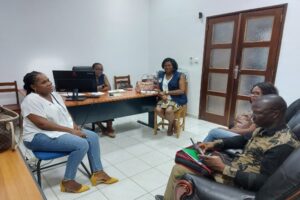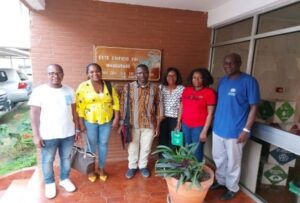From 23-25 January 2024, the São Tomé and Principle LabCoP country team conducted a self-assessment of the country’s HIV viral load (VL) testing cascade and integration readiness of their laboratory systems. The workshop was held at the São Tomé Pestana Hotel with participants from the main laboratory departments of the Ministry of Health and partners, and a team of experts from ASLM’s LabCoP Management team. The workshop aimed to identify gaps and develop interventions to address them.
During the workshop, the LabCoP Management team presented the purposes of the LabCoP project, and addressed the objectives of HIV VL assessment and integrated diagnostics testing. The country team was engaged through active discussions with some guidelines in place to support the selection of more appropriate answers to the self-assessment tools.
The ASLM team visited the National TB/HIV Reference Laboratory to learn about their diagnostics testing and work processes, and the Department of Laboratories at the Ministry of Health, where they were welcomed by the General Director of Health Care, Dr Isaulina Barreto. She expressed her gratitude for the LabCoP project and for understanding the objectives of the assessment, encouraging the country team to take the opportunity to improve the national laboratory systems.

The LabCoP Management team, accompanied by Dr Yardlene Sequeira, reference laboratory manager and country Team Leader; and Dr Andreza Batista, Department of Epidemiological Surveillance Manager, also visited the World Health Organization (WHO) office. There, during a dialogue with Dr Vilfrido Santana Gil, who is responsible for WHO’s health emergency response sector, the need for collaboration it was emphasized for advocacy in response to the gaps that the evaluation detected. Some of the areas needing support included: integrated sample transport, laboratory information system, waste management, quality management system, training of staff on molecular biology and the integration of diagnostic systems and networks in general.
São Tomé’s sound practices of demand creation and maintaining the clinical staff’s continuing training on HIV VL can be shared with the LabCoP community through ECHO sessions, so that other countries may learn from their experiences and improve their own systems. São Tomé also has a well-defined list of priority diseases, including some zoonotic diseases, and has some testing in progress for these diseases, making it easier to elaborate and disseminate guidelines for integrated diagnostic testing. The assessment report has been shared with the country and a work plan has been drafted and discussed. The country is refining the work plan so that it can be validated by the country for use in advocating for support with the Ministry of Health partners and other stakeholders. Further assessments are planned in the future to monitor implementation of interventions.




